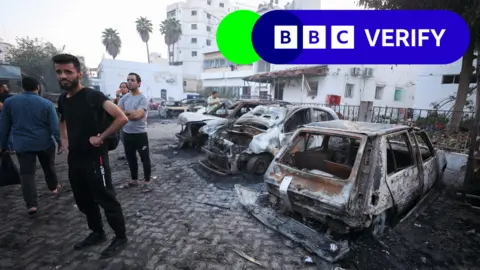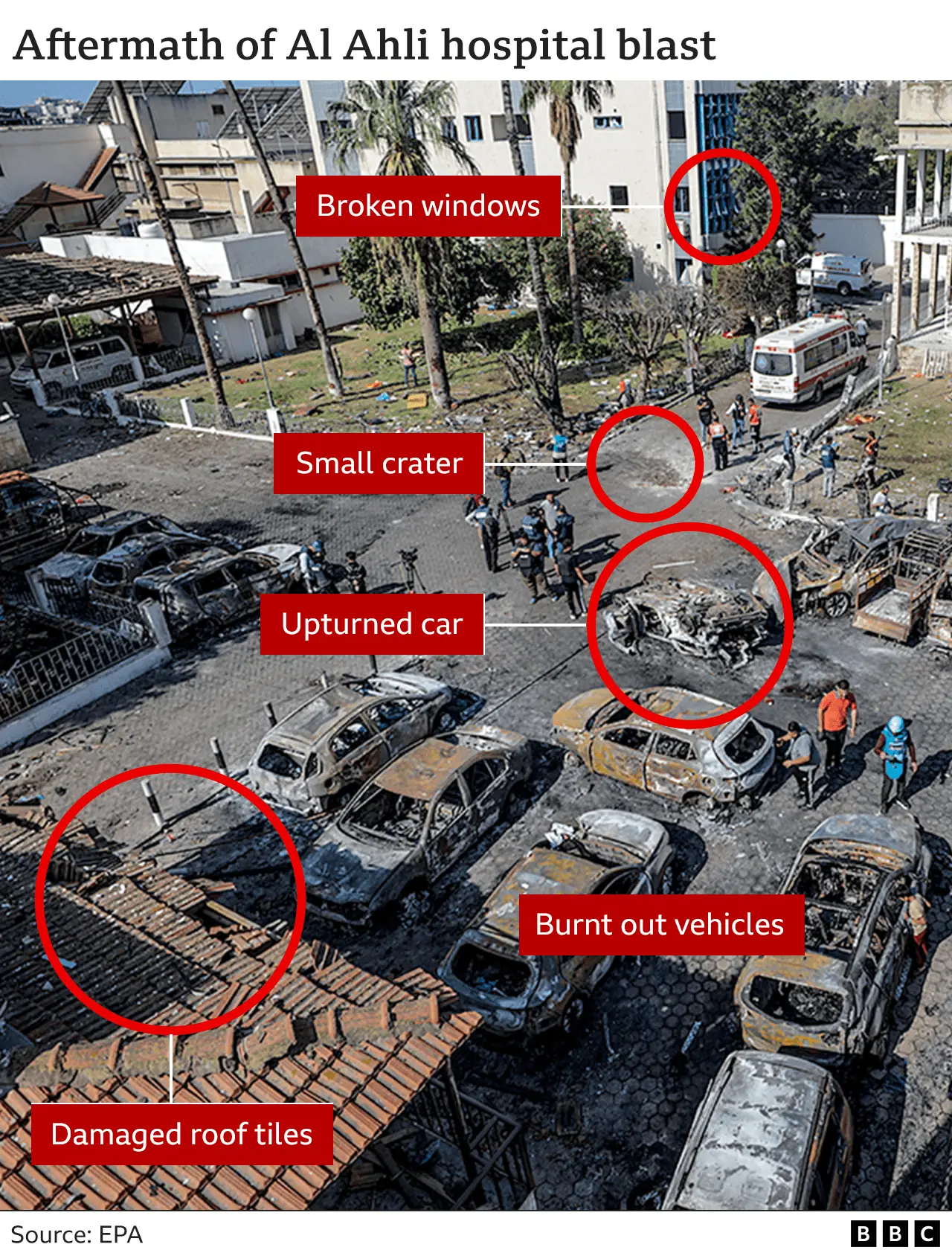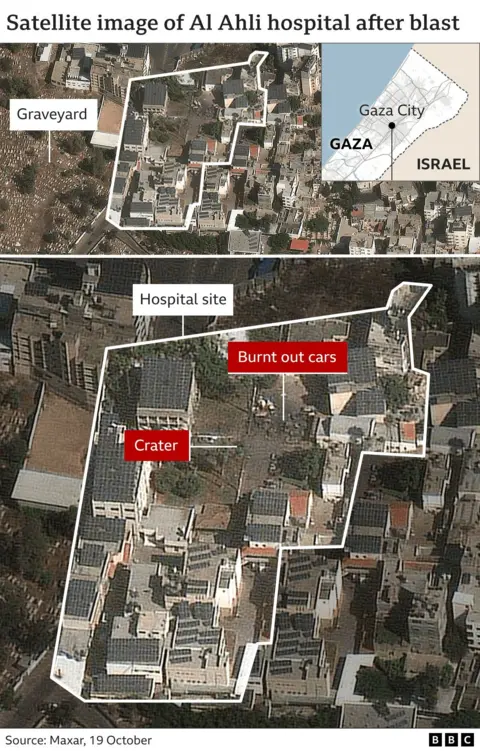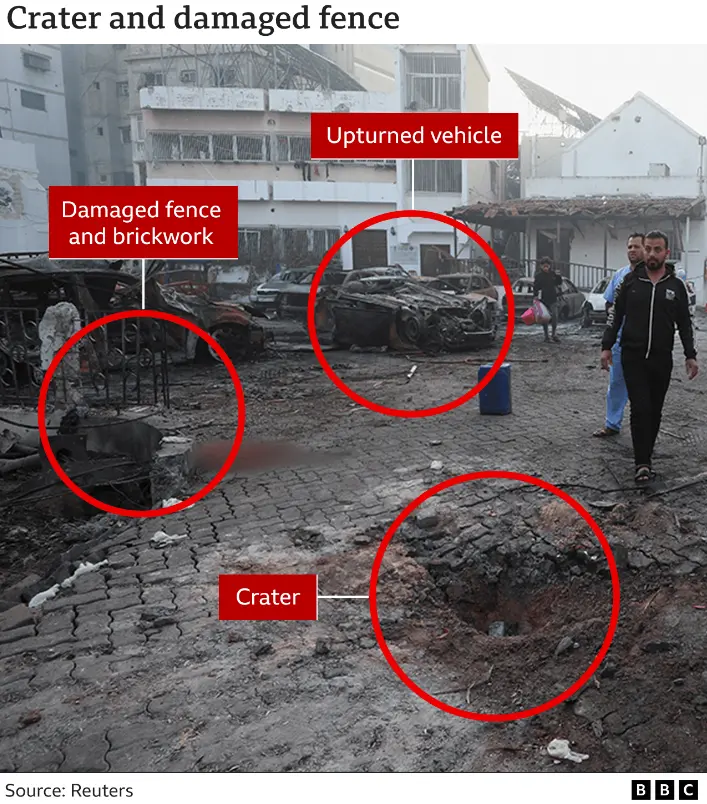Gaza hospital: What video, pictures and other evidence tell us about Al-Ahli hospital blast
 Reuters
ReutersA deadly blast at the crowded Al-Ahli hospital in Gaza City is feared to have killed hundreds of people.
The Hamas-controlled Palestinian authorities in Gaza immediately blamed Israel, claiming it was a deliberate air strike. Israel has denied involvement.
Amid the claim and counterclaim, getting to the truth is harder than ever.
BBC Verify is trying to unravel what is and isn't known - looking at video footage, still imagery and other evidence, including eyewitness accounts. In addition, a BBC journalist has been to the blast site, where there is limited access.
New information is emerging all the time, so we will continue to investigate and report our findings as we learn more and talk to experts about the evidence.
It is also important to note that as well as the physical fighting, this conflict is playing out as an information war. This is not the first time authorities in Israel and Gaza have given completely different accounts of an explosion. We are also looking at their various claims and statements.
The blast
The explosion at the hospital happened at around 19:00 local time (16:00 GMT) on Tuesday. A 20-second video which circulated on social media purporting to show the blast was the first significant piece of visual evidence to emerge of the incident.
In it, you can hear the whistling sound of an incoming projectile, followed by an explosion and a huge fire.
Live footage from the Al-Jazeera media network aired at 18:59 local time showed a bright light rising in the skies above Gaza. It flashes twice before drastically changing direction, and it then explodes.
An explosion is then seen on the ground far away, followed by a much larger explosion closer to the camera, which the BBC has geolocated.
Some commentators have suggested it is from a rocket which appears to explode or disintegrate.
Other footage which surfaced on social media channels showed what appears to be the same blast from different angles and distances.
We contacted 20 think tanks, universities and companies with weapons expertise. Nine of them are yet to respond, five would not comment, but we spoke to experts at the remaining six.
We asked whether the available evidence - including the size of the explosion and the sounds heard beforehand - could be used to determine the cause of the hospital blast.
So far, the findings are inconclusive. Three experts we spoke to say it is not consistent with what you would expect from a typical Israeli air strike with a large munition.
J Andres Gannon, an assistant professor at Vanderbilt University, in the US, says the ground explosions appeared to be small, meaning that the heat generated from the impact may have been caused by leftover rocket fuel rather than an explosion from a warhead.
Justin Bronk, senior research fellow at the UK-based Royal United Services Institute, agrees. While it is difficult to be sure at such an early stage, he says, the evidence looks like the explosion was caused by a failed rocket section hitting the car park and causing a fuel and propellant fire.
Mr Gannon says it is not possible to determine whether the projectile struck its intended target from the footage he has seen. He adds that the flashes in the sky likely indicate the projectile was a rocket with an engine that overheated and stopped working.
Valeria Scuto, lead Middle East analyst at Sibylline, a risk assessment company, notes that Israel has the capacity to carry out other forms of air strike by drone, where they might use Hellfire missiles. These missiles generate a significant amount of heat but would not necessarily leave a large crater. But she says uncorroborated footage shows a pattern of fires at the hospital site that was not consistent with this explanation.
Visual evidence from the blast site
The BBC was able to match details of buildings and the layout of the Al-Ahli hospital site with publicly available satellite imagery, to establish the hospital was the scene of the blast.
Based on available evidence, it appears the explosion happened in a courtyard which is part of the hospital site. Images of the ground after the blast do not show significant damage to surrounding hospital buildings. What the images do show are scorch marks and burnt-out cars.

The hospital is owned and run by the Anglican Church.
Canon Richard Sewell, the dean of St George's College in Jerusalem, told the BBC that about 1,000 displaced people were sheltering in the courtyard when it was hit, and about 600 patients and staff were inside the building.

Images posted online suggest the hospital had previously been hit.
A Facebook post from 14 October shows damage to a room which is believed to be Al-Ahli Hospital's Diagnostic Cancer Treatment Centre. We have asked the IDF if they had hit the hospital and are awaiting a response.
The victims
BBC reporter Rushdi Abualouf has been to the the Al-Ahli Hospital. Witnesses there report scenes of devastation, and say bodies are still being collected.
One man told him that women, children and elderly people were at the hospital when the explosion happened.
We are still analysing images and footage of the victims to determine what they can tell us about the blast from the nature of their injuries.
The BBC has viewed extremely graphic images of victims and survivors at the explosion site, which show catastrophic injuries.

More on Israel-Gaza war
- Follow live: Latest updates
- From Israel: Pain still raw a month after Hamas attacks
- Watch: The devastating effects of war on Gaza's children
- Explained: Who are the hostages taken by Hamas from Israel?
- History behind the story: The Israel-Palestinian conflict

Pathologist Derrick Pounder, a founder member of Physicians for Human Rights in the UK and an expert in the field of conflict injuries, viewed some of the images.
"The overall pattern of scattered injuries is what would be expected from shrapnel resulting from an explosion," he said.
But he also said it was not possible to clearly make out all of the injuries in the limited number of verified images available.
The Palestinian health ministry said on Wednesday 471 people were killed in the blast.
The Israel Defense Forces (IDF) said this number has been deliberately inflated, but has not released its own assessment of how many died. Because of lack of access to the site for independent organisations, it is difficult to verify the number killed.
What we don't know yet
One of the most critical pieces of evidence is the nature of the crater left behind by the explosion.
The IDF say that the absence of a large crater, or blast damage to adjacent buildings, proves that the explosion was not caused by its weapons. In the image below, you can see one small crater.
Some have suggested that the lack of a large crater could be explained by the use of an "air burst" munition - a weapon set to explode above the ground. But the experts we spoke to said the blast scene was not consistent with this.

Another important part of missing evidence is missile fragments. Projectiles are often identifiable by the wreckage of their shell, and they can be used to determine the projectile's origin. But in this case, we have not seen that evidence.
The IDF has released a recording of what it says is an intercepted conversation between two Hamas militants acknowledging the hospital was hit by a projectile fired by Palestinian Islamic Jihad (PIJ). PIJ is the second-largest militant group in Gaza, and supported Hamas's 7 October attack on Israel.
It is not possible to independently verify this recording. In a statement, PIJ denied any involvement and blamed Israel for the blast.
There appeared to be an inconsistency in the Israeli briefing regarding where the rocket they believed caused the blast was fired from.
The spokesman said it had been fired from a nearby cemetery - and there is a cemetery next to the hospital. But a map displayed by the spokesman showed a launch site further away. We have not been able to locate a cemetery there.
Additional reporting by: The Visual Journalism team, Tom Spencer, Shayan Sardarizadeh, Jake Horton, Emma Pengelly and Jamie Ryan
Update, 26 October: This article has been updated to include the following link to further analysis of the blast


In-depth analysis from Frank Gardner looking at what started the war between Israel and Hamas.

